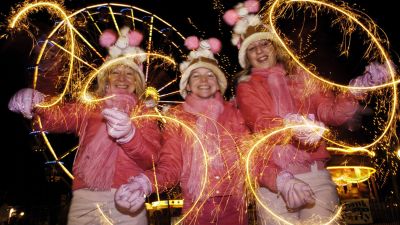New Year's Eve parties allowed in England as Omicron Covid variant spreads in UK

New Year’s Eve parties were allowed to go ahead in England as Sajid Javid announced there will be no new Covid restrictions before the end of 2021.
The health secretary's announcement means there will be no restrictions on social gatherings beyond the Plan B measures.
Nightclubs can open for partygoers on New Year's Eve and there will be no limits on numbers in pubs.
Covid passes will be mandatory for large events. Work from home guidance and increased mask wearing in public places remains.
But Mr Javid advised those celebrating the start of 2022 to test themselves beforehand and left the door open for fresh measures to be potentially introduced in January.
Echoing the Mr Javid's announcement, Boris Johnson tweeted on Monday there would be “no new restrictions introduced in England before the New Year” but urged caution.
The decision came after Mr Johnson was briefed on the latest Covid data by chief medical officer Professor Chris Whitty and chief scientific adviser Sir Patrick Vallance.
Hospitality sector welcomed the move.
With pubs, bars and restaurants hard hit in the run-up to Christmas due to mass cancellations over Omicron variant fears, UKHospitality chief executive Kate Nicholls said the latest announcement presented a “lifeline” for the sector.
Ms Nicholls said: “Hospitality businesses will be raising a new year’s toast to celebrate the Government’s pragmatic and proportionate approach.
“This will give a real lifeline for many who have struggled with the loss of trade in the run-up to Christmas and the loss of new year on top of that would have been devastating for many.
“It will be a welcome boost and keeping restrictions to a minimum and lifting the remaining restrictions as quickly as possible to help the beleaguered sector back on to the road to recovery.”
Michael Kill, Night Time Industries Association CEO, said the sector was "pleased that the prime minister has listened to us".
He said: “Our industry can now start to plan with some certainty over the next week, and make up for lost time promoting one of the key nights of the year in the coming days."
He also urged the government to generate a long-term strategy for managing Covid variants, saying the "open, close strategy, which has had an huge impact on our industry, is not sustainable.”
A spokesperson for the British Beer and Pub Association (BBPA) said: “It is good news to know that we are staying open at new year. This festive trade is very important for the sector to see us through the winter.
“We hope this decision is a positive signal for the future as we enter 2022. We wish to trade our way to recovery.
“However, pubs and brewers will need more certainty going forwards to allow businesses and customers to plan ahead with confidence.”
Mark Davyd, CEO of Music Venue Trust, said there would “obviously be some relief” but called for help to improve ventilation in venues and “more clarity” on the government’s long-term vision.
Meanwhile, those in Wales and Scotland are living with curbs on hospitality, with nightclubs having to shut.
First Minister Nicola Sturgeon, speaking after Scottish government provisional data showed the Christmas period had seen the highest ever number of Covid-19 cases, urged people to limit socialising in person “as much as possible”.
England also saw a record number of infections, with 113,628 reported on Christmas Day.
There were 1,281 Covid-19 hospital admissions in the country on Christmas Day – the highest number since February 16 and up 74% week-on-week.
But hospital admissions remain below that during the second wave of the coronavirus peak, when admissions reached 4,134 on January 12.
A total of 8,474 people were in hospital in England with Covid-19 as of 8am on December 27 – the highest number since March 5.
But that is also lower than the peak last winter - with 34,336 Covid patients in hospital on January 18.
Chris Hopson, chief executive of NHS Providers, which represents NHS trusts in England, said there had been a growing number of Covid hospital admissions but “not precipitately so”.
He said trusts are not reporting large numbers of patients arriving with Covid-type breathing problems like last January.
But he warned a high number of staff absences in the NHS – due to staff isolating from Covid – are creating such pressures that “even relatively small numbers of extra Covid cases may bring difficult decisions”.
The NHS Providers chief executive told BBC Breakfast NHS staff absences could pose a "bigger challenge for them than necessarily the number of people coming in who need treatment because of Covid".
He also warned "we still don’t know exactly what’s going to happen at the point when Omicron meets the older population, and clearly we’ve had a lot of intergenerational mixing over Christmas, so we all are still waiting to see, are we going to see a significant number of increases in terms of the number of patients coming into hospital with serious Omicron-related disease.”